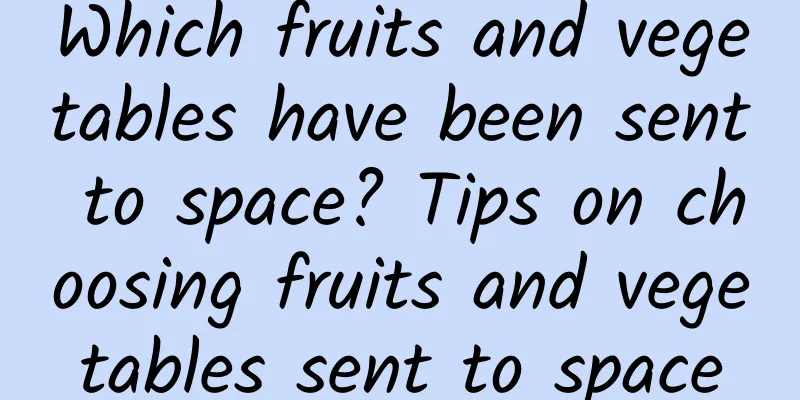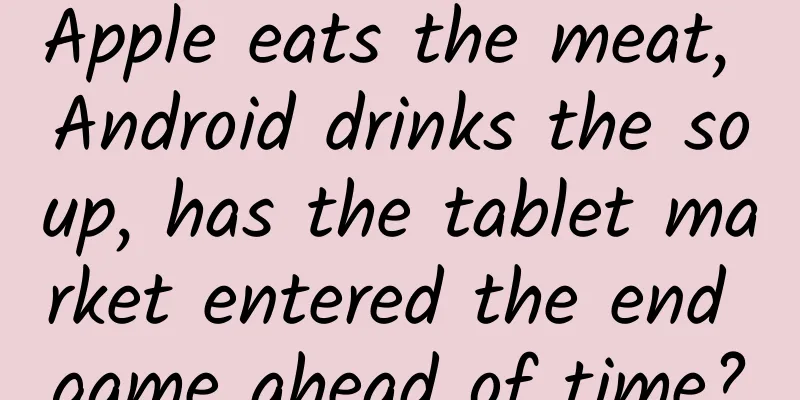Which fruits and vegetables have been sent to space? Tips on choosing fruits and vegetables sent to space

|
On June 5, the Long March 2F Yao-14 carrier rocket carrying the Shenzhou XIV manned spacecraft successfully flew into space, sending three astronauts, Chen Dong, Liu Yang, and Cai Xuzhe, to the Chinese space station. The astronauts will work and live in space for half a year, and the mission is heavy, so they can't be careless about eating and drinking. In addition to the common prepared space food, they can also enjoy fresh fruits and vegetables. According to aerospace experts, the three astronauts can not only taste apples like their "predecessors", but also have a new sweet and sour favorite - grapes. Why are apples and grapes lucky enough to be sent to space, rather than juicy and delicious fruits and vegetables such as oranges? Let's learn about the tips for selecting fruits and vegetables for space travel. Which fruits and vegetables have “been to the sky”? Before we take stock of fruits and vegetables in space, let's take a look at the typical diet of the International Space Station. Breakfast: orange juice, peaches, sausages, cocoa, scrambled eggs and sweet rolls; lunch: cream of mushroom soup, ham and cheese sandwiches, stewed tomatoes, bananas and cookies; dinner: shrimp, fried steak, broccoli, strawberries, pudding and cocoa. A careful screening shows that the diets of foreign astronauts include fruits and vegetables such as peaches, tomatoes, bananas and strawberries. Since my country launched its first manned space mission in 2003, the variety of food for astronauts has continued to enrich, from the ready-to-eat meals of Shenzhou V, to the hard meals of Shenzhou VII, to the customized dishes of Shenzhou X. It can be said that the maximum degree of personalized customization has been achieved. It is understood that the diet of Chinese astronauts has distinct Chinese food culture characteristics, including staple food, side dishes, soups, beverages and fruits, etc. The staple food includes rice, rice dumplings, and dumplings, and the side dishes are various Chinese dishes, such as braised prawns, fish-flavored pork shreds, braised beef, and Kung Pao chicken, which are guaranteed to whet the appetite of astronauts. Chinese fruits were launched later. It was not until 2013 when the Shenzhou 10 manned spacecraft launched a meal customization service that fresh fruits appeared on the menu for Chinese astronauts, and the variety was limited. It is reported that the Shenzhou 12 manned spacecraft prepared more than 120 kinds of food for astronauts, and the only fruit among them was apple. In addition to apples, fresh fruits and vegetables used in my country's space missions include green peppers, sweet oranges, bananas, carrots, celery, etc. These fruits and vegetables are all sent up via manned or cargo spacecraft, but they are only a small part of the astronauts' diet. The quantity and variety are far from meeting the needs, and they can be called "space luxury goods." It is worth noting that bananas and oranges are popular on Earth, but they appear less and less frequently on space cargo lists. The key reason is that they emit a special smell. Although it is not as "strong" as durian, some people don't like it after all. In addition, studies have shown that banana peels contain some fat and protein, which will inevitably produce an unpleasant odor during storage. Astronauts may be forced to give up their favorites. But what's interesting is that Russian spacecraft often transport some special smelling ingredients, such as onions and garlic. For this, Russian astronauts have long been prepared. They will store the food in well-sealed containers and make them into bite-sized pieces. There are many restrictions on the export of fruits and vegetables There are many types of space food, including ready-to-eat food, rehydrated food, heat-stable food, frozen and refrigerated food, irradiated food, natural food and rehydrated beverages. Fresh fruits and vegetables are natural foods, and they must first meet the general requirements of space food: First, fresh fruits and vegetables must be safe to eat, and no foodborne diseases or food poisoning should occur. Second, fresh fruits and vegetables must be able to withstand the special environmental factors of aerospace, such as impact, vibration, acceleration, etc., and their nutritional value will not be lost. Third, under weightless conditions, astronauts face physiological challenges. Long-term space missions may cause bone calcium loss, muscle atrophy, and erythropenia, so space food must provide sufficient high-quality protein and calcium, as well as an appropriate calcium-phosphorus ratio and vitamin D. Although this is not the "main business" of fresh fruits and vegetables, supplementing vitamins cannot be ignored. Fourth, the fat content of space food should not be too high, so as not to aggravate the symptoms of space motion sickness. In order to prevent cardiovascular dysfunction, it is also required to limit the supply of sodium in space food, while ensuring the supply of potassium. This is good for fresh fruits and vegetables. Fifth, the space inside the spacecraft and space station is precious, so space food must be as light and small as possible, and must not contain residue. It is understood that during the "Shenzhou XII" mission, only a few dozen apples were allowed to "go on a business trip in space", so the astronauts were reluctant to eat them... After all, fresh fruits and vegetables are different from meat, eggs and milk. In addition to meeting the general requirements of space food, special factors must also be considered. First of all, the fruits and vegetables that go to space must be durable in storage and transportation, not easy to deteriorate and rot, and not afraid of minor bumps. Generally speaking, fresh fruits and vegetables are loaded into the spacecraft 24 hours before the rocket launch, after all, space preservation technology is full of challenges. Secondly, the selected fruits and vegetables should be nutritious, especially beneficial to the intestinal health of astronauts. Astronauts have to complete various complex tasks in a specific environment, and nutritional supplementation is very important. However, the intestinal absorption capacity is likely to be weakened, so additional dietary fiber is needed to accelerate the recovery of health. Furthermore, fruits and vegetables for "space travel" must be less juicy and easier to eat, which directly negates many delicacies that require complicated peeling and pickling processes, such as watermelon. You know, in a weightless environment, you can't just rely on eating fruits to replenish water, after all, the water is likely to float in the air. If astronauts are not careful, they may inhale water droplets into their respiratory tract, causing suffocation. Finally, quality and taste are important. The specific environment makes astronauts have very special taste requirements and their appetite will also be reduced, so the carefully selected space fruits and vegetables must be appetizing and even pleasing to the body and mind. If even the favorite fruits and vegetables become bland and tasteless, it will inevitably affect the work efficiency and health of astronauts. Finally, when asked why apples and grapes were chosen for the mission, aerospace experts explained it in a simple and vivid way: "Shenzhou XII" brought apples because they are nutritious and can be stored for a long time; "Shenzhou XIV" brought grapes this time because they are easy to eat, have dense flesh and are seedless, and the skin can even be eaten. Unlike grapes and oranges, which are very juicy and have to be peeled, the astronauts don't even need toilet paper to wipe the juice when eating grapes. |
<<: There was a tornado last night, and the trees were uprooted! How to escape in a tornado?
Recommend
Does sleeping more when you have a cold really help?
After being infected with the Omicron strain of t...
360 Vizza Mobile Review: A Phone More Worth Its Price Than iPhone X
In 2011, the domestic smartphone market ushered i...
If you don’t understand these 6 points, you can’t be creative in advertising
Creativity is definitely the most frequently ment...
Case solved! Doctor says eyelashes that fell into the eye are still hidden in the eye
June 6 is the National Eye Care Day. Eyes are oft...
Subverting cognition: It only takes 1 to 3 seconds! How can humans "smell" things so quickly?
Author: Xu Yahui Duan Yuechu Human olfactory perc...
GM may be the first company to test self-driving cars in New York
The rapid iteration of intelligent technology has...
Are all 400 numbers legitimate?
The telephone number starting with 400 is a virtu...
No one knows more about corpses than I do! Not for the faint of heart!
Expert of this article: Zhang Yinming, PhD in For...
A guide to traffic channels for Douyin live streaming rooms!
When it comes to Tik Tok live streaming , the mos...
Are smart children genetic or "chicken baby"? These twin studies show that it's not simple
In today's era where education is extremely i...
Review: A traffic-generating course with a conversion rate of over 35%
The author reviews a training camp project in whi...
The key points of KFC’s “Crazy Thursday” marketing!
A day or two ago, KFC successfully registered &qu...
Global Science News | Nuclear power heating! Shandong Haiyang becomes the first "zero-carbon" heating city in China
Nuclear energy Shandong Haiyang starts nuclear en...
Without high technology, how did the ancients keep national security secret?
Throughout the vast course of history, the confid...
Get serious "C4D case comprehensive teaching"
This course provides comprehensive teaching of C4D...









